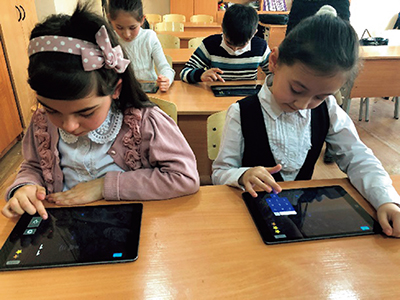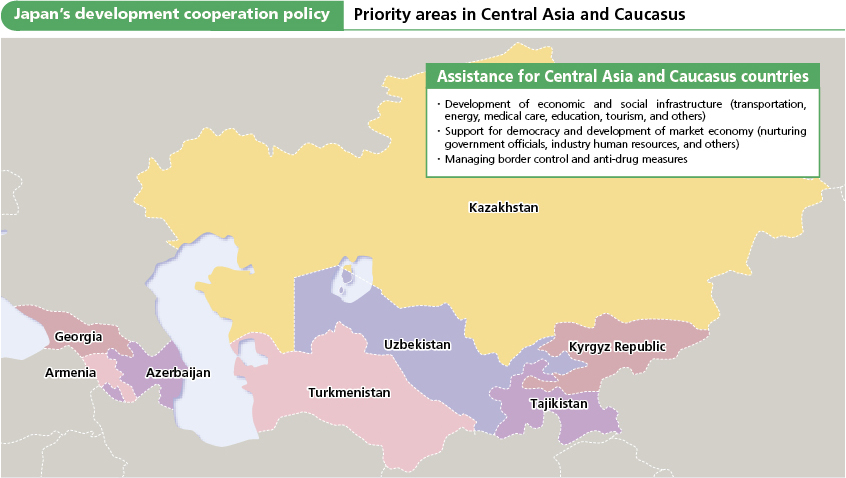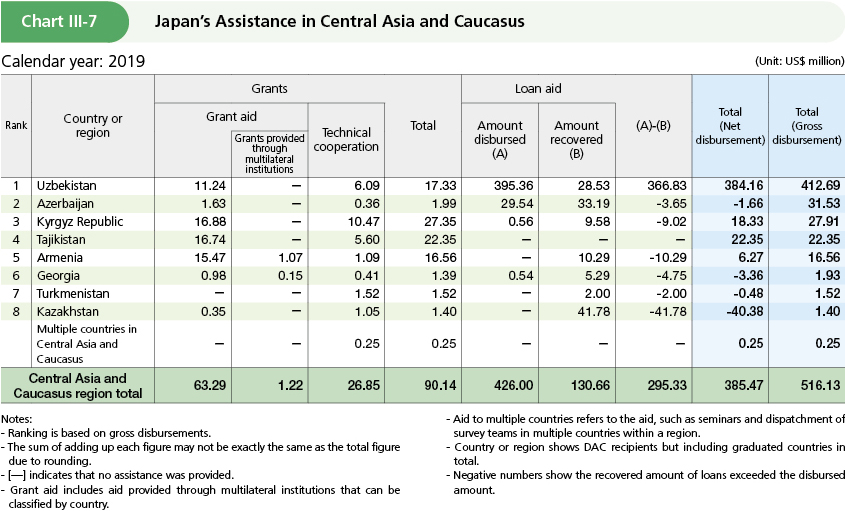6. Central Asia and Caucasus
The stability and development of the Central Asia and Caucasus region, surrounded by Russia, China, South Asia, the Middle East, and Europe, bear a great significance for those of the Eurasian region as a whole. Also, this region is strategically important since it holds an abundance of natural resources such as oil, natural gas, uranium, and rare metals. From this point of view, Japan has been supporting the promotion of fundamental values in the countries of the region, such as human rights, democracy, market economy, and the rule of law. Japan has also been supporting nation-building efforts for long-term stability and sustainable development in this region, while taking into consideration a broader regional perspective which covers Afghanistan, Iran, and other neighboring regions surrounding Central Asia.
●Japan’s Efforts

Children in a school in Uzbekistan learning arithmetic using e-learning materials which also contribute to efforts against COVID-19 (Photo: JICA)
Japan has been providing assistance for the Central Asia and Caucasus countries, which became independent following the collapse of the former Soviet Union, in diverse areas such as improvement of aging infrastructure, human resources development for the transition to a market economy, and the rebuilding of social systems including health and medical care, in order to support the efforts of each country toward the transition to market economy systems and economic development.
With regard to Japan’s relationship with the Central Asian countries, based on the idea that it is important for countries in the region to work together to resolve common challenges in the “open, stable, and self-sustained development” of the region, Japan launched the “Central Asia plus Japan” dialogue framework in 2004 and has continued to strive to fulfill its role as a “catalyst” for regional cooperation. In recent years, Japan has been promoting more practical cooperation in addition to a variety of dialogues.
In August 2020, the Foreign Ministers’ Special Video Conference of the “Central Asia plus Japan” Dialogue was held with Foreign Minister Motegi as a chair. At the conference, Foreign Minister Motegi and the foreign ministers of five Central Asian countries held discussion on (i) regional cooperation in Central Asia and cooperation between Central Asian countries and Japan amid the worldwide spread of COVID-19 and (ii) way forward for cooperation toward the upcoming 30th anniversary of the establishment of diplomatic relations with Japan in 2022, particularly on the direction of the discussions towards the 8th Foreign Ministers’ Meeting. The Chairperson’s Statement was issued after the Conference. Furthermore, in order to support each country’s efforts on the response to COVID-19, Foreign Minister Motegi stated that Japan is: (i) providing grant aid for health and medical equipment; (ii) providing technical assistance as well as health and medical supplies through international organizations; (iii) extending grant aid for the provision of Avigan tablets to countries which requested the medicine; and (iv) actively engaging in sharing information, lessons learned, and experiences on addressing infectious diseases, including exchanges of opinions among medical experts. In response to this, the foreign ministers of the Central Asian countries expressed their appreciation for Japan’s cooperation. Along with stating that Japan’s basic policy toward Central Asia which has been built up until now remains steadfast even under the COVID-19 pandemic, Foreign Minister Motegi noted the unchanging importance of a free and open international order, to which the foreign ministers of the Central Asian countries expressed their assent.
With regard to Japan’s bilateral relations with Uzbekistan in particular amongst the Central Asian countries, President Mirziyoyev and then Prime Minister Abe held a summit meeting during his visit to Japan in December 2019 and agreed on economic cooperation projects, including a total of approximately ¥190 billion in ODA loans in the fields of electric power and agriculture. Furthermore, Deputy Prime-Minister and Minister of Investments and Foreign Trade Umurzakov visited Japan in December 2020 and held meetings with Deputy Prime Minister and Minister of Finance Aso, Foreign Minister Motegi, and others. During the meeting with Foreign Minister Motegi, Deputy Prime-Minister Umurzakov expressed his appreciation for Japan’s assistance, including that for COVID-19 response. Both countries shared the view to steadily implement the economic cooperation projects agreed upon during the President’s visit to Japan in December 2019.
As for Japan’s relationship with the Caucasus countries, Japan announced the “Caucasus Initiative,” during then Foreign Minister Kono’s visit to Armenia, Georgia, and Azerbaijan in September 2018, based on the promotion of cooperation for self-sustained development of the Caucasus region, which plays an important role as a gateway linking Asia and Europe. The basic policy of the Initiative consists of two pillars, namely (i) assistance for human resources development of architects for state building (human resources development) and (ii) assistance for paving the way to “Appealing Caucasus” (infrastructure development and business environment improvement).
Japan has accepted 11,447 trainees from Central Asia and Caucasus countries and dispatched 3,209 experts to those countries by 2019 as part of its support for human resources development. Moreover, Japan has been providing support in the development of human resources necessary for new nation-building efforts, including the implementation of the Project for Human Resource Development Scholarship, which is a study-in-Japan program for young government officials, and the development of human resources for business through the Japan Center for Human Resources Development.
Furthermore, as part of its assistance for COVID-19 response, Japan and six Central Asia and Caucasus countries signed and exchanged notes on a total of ¥2.5 billion in grant aid for the provision of health and medical equipment. In addition to this, Japan has provided a total ¥190 million in health and medical equipment for five Central Asian countries through technical cooperation and grant aid projects.


